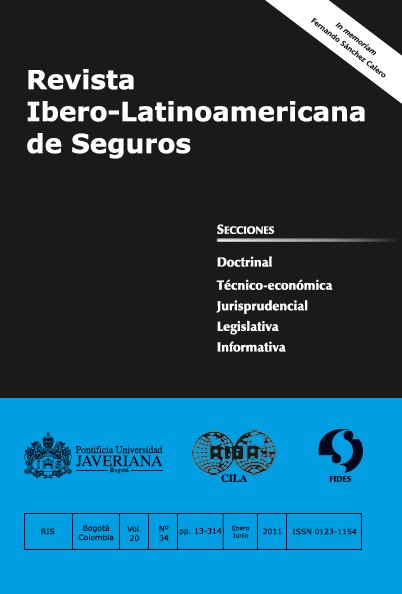Abstract
Property and casualty insurance are governed by the principle of indemnity; in practice, in several occasións insureds and beneficiaries experience a feeling frustration when is ascertained the settlement of the recoverable loss, which obeys to the way this principle works under property and casualty insurance, Though, there are arguments of different type supporting such fact, full and complete indemnification which is poper on the area of civil liability, is not applicable in the same way under property and casuality insurance, since it is tried to verify in this study, the patrimonial consequences of any damage as thet are valued and indemnified under a property and causlty insurances, can be much more limited.
The task of corroborating this assertio, does imperiously leads to define the area where full and complete indemnification related to civil liability applies and to ecaluate how principle of indemnity arising from property and casualty insurance contracts works and therefore, the extensión and content of the protection granted under this type of insurance contracts.
This journal is registered under a Creative Commons Attribution 4.0 International Public License. Thus, this work may be reproduced, distributed, and publicly shared in digital format, as long as the names of the authors and Pontificia Universidad Javeriana are acknowledged. Others are allowed to quote, adapt, transform, auto-archive, republish, and create based on this material, for any purpose (even commercial ones), provided the authorship is duly acknowledged, a link to the original work is provided, and it is specified if changes have been made. Pontificia Universidad Javeriana does not hold the rights of published works and the authors are solely responsible for the contents of their works; they keep the moral, intellectual, privacy, and publicity rights.
Approving the intervention of the work (review, copy-editing, translation, layout) and the following outreach, are granted through an use license and not through an assignment of rights. This means the journal and Pontificia Universidad Javeriana cannot be held responsible for any ethical malpractice by the authors. As a consequence of the protection granted by the use license, the journal is not required to publish recantations or modify information already published, unless the errata stems from the editorial management process. Publishing contents in this journal does not generate royalties for contributors.


